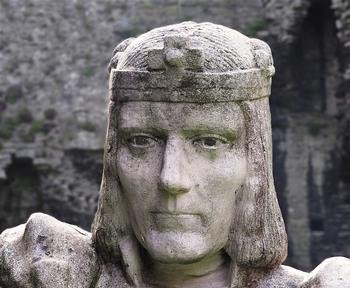Quiz Answer Key and Fun Facts
1. When Henry came to the throne one of the things he did was reform the currency which had been debased. At that time, what denominations of currency were in use?
2. As part of his imperial concept, Henry had his eldest surviving son (also Henry) crowned as king of England. What title was given to his next son Richard?
3. One of the problems facing Henry's judicial system was the right of sanctuary - a right that he was successful in abolishing.
4. When Becket was chancellor he argued against many of the judicial reforms proposed by Henry II.
5. Upon election as Archbishop of Canterbury, Becket....
6. During the Norman and Plantagenet eras, what city was the capital of the Duchy of Normandy?
7. According to legend, Henry II had his most well known mistress Rosamonde Clifford secreted in a bower in a maze near which of his palaces?
8. During the quarrel between Henry and Becket, Becket enjoyed the consistent support of his fellow bishops and the pope.
9. Why was Henry II angered at the final resolution of the court case of Philip de Brois?
10. Clerical courts had a broad area of authority. In addition to claiming authority to deal with all matters involving a member of the clergy, it also dealt with inheritance, wills, marriage and all matters dealing with oaths, promises and verbal disputes. In an attempt to determine which cases should be tried in clerical courts and which in civil courts Henry called a council of churchmen and laymen to attempt to resolve the dispute. For which of the following did the Constitutions of Clarendon provide?
11. As a result of Becket's refusal to accept the Constitutions of Clarendon, Henry began to put pressure on Becket on matters arising from his term as chancellor. As a result of this pressure, Becket fled to France. Where was his refuge in France?
12. The incident that led to the martyrdom of Becket was the decision of Henry II to have his son Henry (the Young King) crowned.
13. Of the four knights who left Henry's court and set off for England to dispatch Thomas, one had served under Thomas's banner. Which was he?
14. Although the brunt of the blow was taken on the arm by Grim, a monk of Canterbury, who struck the first blow against Becket?
15. There have been two remarkable films dealing with Henry II and his life. The first was entitled "Becket" and the second "The Lion in Winter". Who played Becket in the first of the movies?
Source: Author
tripeuro
This quiz was reviewed by FunTrivia editor
fringe before going online.
Any errors found in FunTrivia content are routinely corrected through our feedback system.
